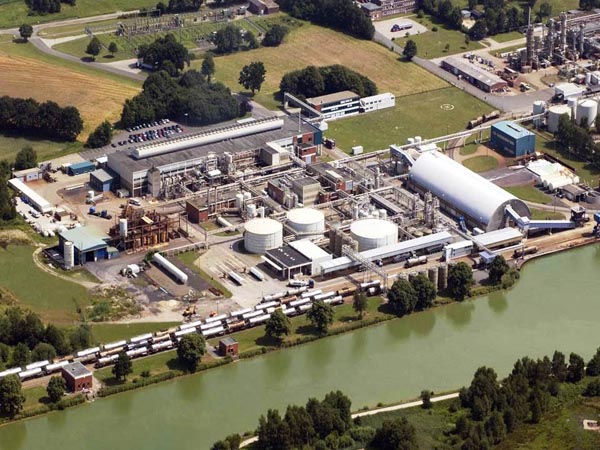AkzoNobel, Evonik to Build JV Chlorine/Potassium Hydroxide Facility in Germany
![]() Print this Article | Send to Colleague
Print this Article | Send to Colleague
AkzoNobel, Amsterdam, and Evonik Industries, Germany, have joined forces to build and operate a new membrane electrolysis facility for potassium hydroxide solution and chlorine in Germany. Startup is expected by the end of 2017.
The 50-50 joint venture involves the construction and operation of a dedicated plant at AkzoNobel's existing site in Ibbenbüren. It will have an annual nameplate capacity of around 130,000 metric tons of potassium hydroxide solution and 82,000 metric tons of chlorine. This will strengthen the leading market positions of both companies. Financial details were not disclosed.

AkzoNobel will take over commercialization of chlorine and hydrogen at the new plant, and will process these products directly at the Ibbenbüren site (photo). Evonik will take over the potassium hydroxide solution for commercialization and processing at its own site in Lülsdorf. This is where Evonik processes potassium hydroxide solution into potassium carbonate (potash).
"This investment in our chlor-alkali activities will make our business even more sustainable," explained Werner Fuhrmann, AkzoNobel's Executive Committee member responsible for specialty chemicals. "Not only will we secure the long-term supply of our customers with chlorine and hydrogen, but our environmental profile and operational efficiency will also further improve."
"The new joint venture will enable us to supply our customers with our potassium derivatives reliably in the long term," added Patrik Wohlhauser, member of Evonik's Executive Board. "At the same time, it means we're making a significant contribution to the environmentally-friendly and sustainable production of potassium derivatives."
All production of chlorine, potassium hydroxide, and caustic lye using mercury-based amalgam electrolysis has to stop by the end of 2017 due to legislative requirements. The planned new membrane electrolysis plant will use a sustainable process which has a more positive environmental profile.
AkzoNobel is the market leader for industrial salt, merchant chlorine, and chloromethanes in Europe, as well as holding a leading position for caustic lye in Europe. Evonik is a European market leader for potassium derivatives as well as a globally leading provider of alcoxides, which are manufactured in Lülsdorf, also by electrolysis.
The joint venture is subject to approval from the applicable regulatory authorities.


